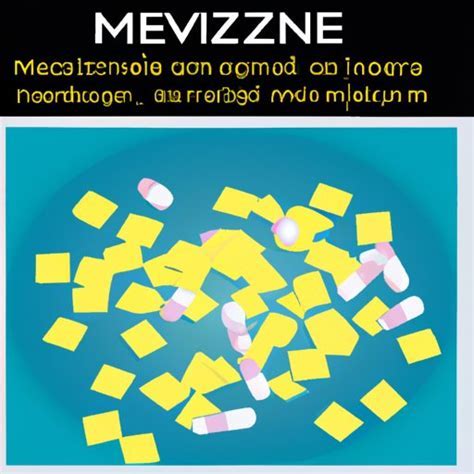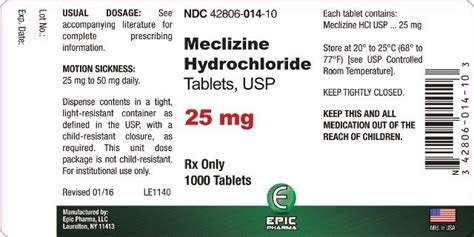Intro
Discover the uses, side effects, and proper dosage of Meclizine, an antihistamine medication used to treat vertigo, motion sickness, and inner ear disturbances. Learn how Meclizine works, its common side effects, and how to take it safely. Get the facts on Meclizine dosage, interactions, and warnings to ensure effective relief from dizziness and nausea.
Are you experiencing dizziness, nausea, or vomiting due to motion sickness, vertigo, or other balance disorders? Meclizine, an antihistamine medication, may be the solution to alleviate these symptoms. In this comprehensive guide, we will delve into the uses, side effects, and dosage of Meclizine, providing you with a thorough understanding of this medication.

What is Meclizine?
Meclizine is an antihistamine medication that belongs to the class of drugs known as histamine H1 receptor antagonists. It works by blocking the action of histamine, a natural substance in the body that causes allergic reactions, dizziness, and nausea. Meclizine is available in various forms, including tablets, capsules, and chewable tablets.
Meclizine Uses
Meclizine is primarily used to treat:
- Motion sickness: Meclizine is effective in preventing and treating nausea, vomiting, and dizziness caused by motion sickness, including seasickness, carsickness, and airsickness.
- Vertigo: Meclizine helps alleviate symptoms of vertigo, a condition characterized by a spinning sensation, dizziness, and loss of balance.
- Balance disorders: Meclizine can be used to treat balance disorders, including labyrinthitis and vestibular neuritis.

Meclizine Side Effects
While Meclizine is generally well-tolerated, it can cause some side effects, including:
- Drowsiness: Meclizine can cause drowsiness, which may impair your ability to drive or operate heavy machinery.
- Dry mouth: Meclizine can cause dry mouth, which may lead to tooth decay or other oral health issues.
- Fatigue: Meclizine can cause fatigue, which may affect your daily activities.
- Headache: Meclizine can cause headache, which may be mild or severe.
- Insomnia: Meclizine can cause insomnia, which may disrupt your sleep patterns.
Less Common Side Effects
- Allergic reactions: Meclizine can cause allergic reactions, including hives, itching, and difficulty breathing.
- Confusion: Meclizine can cause confusion, which may be more common in older adults.
- Increased heart rate: Meclizine can cause an increased heart rate, which may be a concern for people with pre-existing heart conditions.

Meclizine Dosage Guide
The dosage of Meclizine depends on the specific condition being treated and the individual's response to the medication. Here are some general guidelines:
- Motion sickness: Take 25-50 mg of Meclizine 1 hour before traveling, and repeat every 24 hours as needed.
- Vertigo: Take 25-100 mg of Meclizine 3-4 times a day, as directed by your doctor.
- Balance disorders: Take 25-100 mg of Meclizine 3-4 times a day, as directed by your doctor.
Special Considerations
- Children: Meclizine is not recommended for children under 12 years old.
- Older adults: Meclizine may cause more side effects in older adults, including confusion, dry mouth, and drowsiness.
- Pregnancy and breastfeeding: Meclizine may not be safe for pregnant or breastfeeding women. Consult your doctor before taking Meclizine.

Interactions and Contraindications
Meclizine can interact with other medications, including:
- Sedatives: Meclizine can increase the sedative effects of other medications, including benzodiazepines and opioids.
- Antihistamines: Meclizine can increase the antihistamine effects of other medications, including diphenhydramine and chlorpheniramine.
- MAOIs: Meclizine can interact with monoamine oxidase inhibitors (MAOIs), including phenelzine and tranylcypromine.
Meclizine is contraindicated in people with:
- Glaucoma: Meclizine can worsen glaucoma symptoms.
- Urinary retention: Meclizine can worsen urinary retention symptoms.
- Stomach ulcers: Meclizine can worsen stomach ulcer symptoms.

Conclusion
Meclizine is an effective medication for treating motion sickness, vertigo, and balance disorders. However, it can cause side effects, including drowsiness, dry mouth, and fatigue. It's essential to follow the dosage guidelines and consult your doctor before taking Meclizine, especially if you have pre-existing medical conditions or take other medications.
We hope this comprehensive guide has provided you with a thorough understanding of Meclizine uses, side effects, and dosage. If you have any further questions or concerns, please don't hesitate to ask.
What is the difference between Meclizine and Dramamine?
+Meclizine and Dramamine are both antihistamine medications used to treat motion sickness. However, Meclizine is also used to treat vertigo and balance disorders, while Dramamine is primarily used for motion sickness.
Can I take Meclizine with other medications?
+Meclizine can interact with other medications, including sedatives, antihistamines, and MAOIs. Consult your doctor before taking Meclizine with other medications.
Can I drive after taking Meclizine?
+Meclizine can cause drowsiness, which may impair your ability to drive or operate heavy machinery. It's recommended to avoid driving or operating heavy machinery after taking Meclizine.
